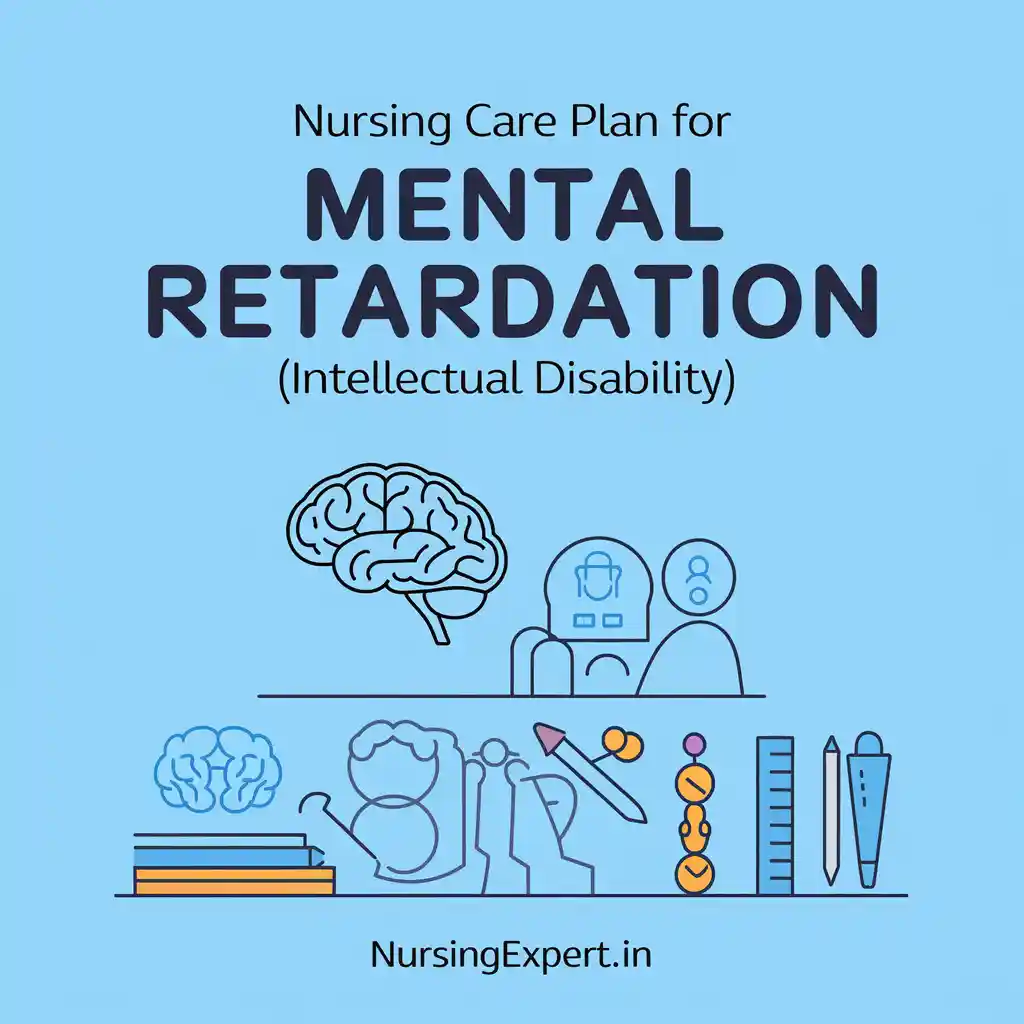Intellectual Disability (ID), formerly known as mental retardation, is a developmental condition characterized by below-average intellectual functioning and deficits in adaptive behavior. These deficits affect an individual’s ability to learn, perform daily tasks, and engage in age-appropriate social interactions. Depending on the severity—from mild to profound—individuals with ID may require varying levels of support in education, self-care, communication, and social interactions.
Thank you for reading this post, don't forget to subscribe!
A well-designed nursing care plan for mental retardation (Intellectual Disability) is essential for providing individualized support and interventions. Such a care plan addresses multiple domains of functioning, including cognitive abilities, communication skills, social interactions, and self-care. This article provides an in-depth overview of ID, its classification, causes, signs and symptoms, and then details a sample nursing care plan based on NANDA guidelines. A downloadable PDF version of the nursing care plan is also available for your convenience.
Understanding Intellectual Disability
Intellectual Disability (ID) is a developmental disorder that results in below-average intellectual functioning and significant limitations in adaptive behavior. These limitations manifest in various domains, including communication, self-care, social skills, and academic performance. Early identification through developmental screening tests is critical, as children who do not achieve appropriate milestones may be diagnosed with ID.
The shift in terminology from “mental retardation” to Intellectual Disability reflects a more respectful and clinically accurate understanding of the condition. Today, the focus is on the degree of support required for daily living rather than solely on IQ scores.


Classification of Intellectual Disability
Intellectual Disability is typically classified into four levels based on the severity of cognitive impairment and the level of support needed:
- Mild Intellectual Disability (IQ 55–69):
- Individuals may have slight delays in language, motor skills, and cognitive development.
- They can often learn practical skills, perform tasks independently, and may even work in semi-skilled or unskilled jobs with minimal support.
- Moderate Intellectual Disability (IQ 40–54):
- Individuals show more significant challenges in communication, motor skills, and academics.
- They may learn basic reading, writing, and math but often require ongoing support in daily tasks and cannot live entirely independently.
- Severe Intellectual Disability (IQ 20–39):
- Marked delays in motor development and limited communication abilities are common.
- Basic self-care skills may be acquired with considerable assistance, and structured routines are essential for safety.
- Profound Intellectual Disability (IQ 0–24):
- Individuals have profound impairments in intellectual functioning and require constant care and supervision.
- Interventions focus on total care, including feeding, hygiene, mobility assistance, and sensory stimulation to encourage minimal communication and interaction.
Causes of Intellectual Disability
The causes of Intellectual Disability are multifactorial and can include:
- Prenatal Factors:
- Maternal infections (e.g., rubella, cytomegalovirus)
- Exposure to toxins (alcohol, drugs, teratogens)
- Genetic abnormalities and chromosomal disorders (e.g., Down syndrome)
- Perinatal Factors:
- Oxygen deprivation (hypoxia) during birth
- Premature birth and low birth weight
- Postnatal Factors:
- Severe infections (e.g., meningitis, encephalitis)
- Traumatic brain injury
- Chronic malnutrition and environmental deprivation
- Seizure disorders and metabolic imbalances
Identifying the cause of Intellectual Disability can be challenging; however, early diagnosis and intervention can greatly improve outcomes and quality of life.
Signs and Symptoms of Intellectual Disability
Individuals with Intellectual Disability often exhibit the following signs and symptoms:
- Delayed Developmental Milestones: Difficulty reaching age-appropriate levels in language, motor, and cognitive skills.
- Learning Difficulties: Struggles with academic tasks and acquiring new skills.
- Communication Challenges: Limited verbal skills or reliance on non-verbal communication methods.
- Social Interaction Difficulties: Challenges in forming and maintaining relationships and understanding social cues.
- Self-Care Deficits: Need for assistance in performing daily living activities such as bathing, dressing, and feeding.
- Behavioral Issues: Immaturity in social behavior, difficulty regulating emotions, and potential for aggressive or impulsive behavior.
Nursing Care Plan for Intellectual Disability
Developing a nursing care plan for Intellectual Disability involves a comprehensive evaluation of the individual’s strengths and challenges. Below is a sample care plan structured in a table format to help nursing students prepare for exams and clinical practice.
A. Assessment
- Subjective Data:
- Patient or caregiver reports delays in language and motor skills.
- Observations of difficulties with daily living tasks (e.g., dressing, feeding).
- Family expresses concerns about the patient’s social interactions and independence.
- Objective Data:
- Assessment of developmental milestones using standardized screening tests.
- Observation of behavior, communication abilities, and adaptive skills.
- Vital signs and physical examination findings.
- Laboratory or imaging studies if relevant.
B. Nursing Diagnosis

Based on the assessment, possible nursing diagnoses for Intellectual Disability include:
- Delayed Growth and Development related to abnormal cognitive function.
- Impaired Verbal Communication related to delayed language skills.
- Risk for Injury related to impaired motor coordination and behavioral challenges.
- Impaired Social Interaction related to difficulty in social adaptation.
- Family Process, Interrupted related to the stress of caring for a child with intellectual disability.
- Self-Care Deficit related to lack of maturity and cognitive limitations.
C. Goals / Expected Outcomes
Short-Term Goals:
- The patient will demonstrate age-appropriate improvements in self-care skills (e.g., improved handwashing, dressing) within 48 hours.
- The patient will respond to simple verbal instructions and show increased social interaction during the care session.
Long-Term Goals:
- Within one month, the patient will exhibit progress in developmental milestones as evidenced by improved communication and social interactions.
- The family will verbalize an understanding of the care plan and participate in interventions that promote the patient’s independence.
- The patient’s risk for injury will be minimized through structured activities and environmental modifications.
D. Interventions / Planning
Key interventions include:
- Educational and Stimulation Activities:
- Provide age-appropriate cognitive and motor stimulation (e.g., puzzles, play therapy).
- Use visual aids and picture cards to improve communication.
- Safety and Environment:
- Ensure the environment is safe and free from hazards.
- Use assistive devices and modify surroundings to reduce injury risk.
- Family Education:
- Educate family members on the patient’s condition and effective care strategies.
- Provide resources and referrals for support groups and counseling.
- Behavioral Interventions:
- Use positive reinforcement to encourage desired behaviors.
- Establish structured routines to reduce disruptive behaviors.
- Health Promotion:
- Encourage proper nutrition, hydration, and regular physical activity.
- Monitor growth parameters (height, weight, head circumference) and refer to a dietitian if needed.
E. Implementation
- Step 1: Assess the patient’s current level of functioning using developmental screening tools and observational methods.
- Step 2: Develop a detailed plan with input from the family and interdisciplinary team.
- Step 3: Initiate interventions, such as cognitive stimulation activities and safety modifications, and provide family education sessions.
- Step 4: Monitor the patient’s response to interventions through daily observations and regular assessments.
F. Rationale
- Stimulation Activities: Enhance cognitive and motor development by providing structured, age-appropriate challenges.
- Family Involvement: Improves adherence to the care plan and ensures a supportive home environment.
- Safety Measures: Reduces the risk of injury in patients with impaired motor coordination.
- Behavioral Strategies: Encourage positive behavior through consistent reinforcement, thereby reducing disruptive behaviors.
G. Evaluation
- Short-Term Evaluation:
- Assess improvements in self-care skills during the shift.
- Monitor the patient’s ability to follow simple instructions.
- Long-Term Evaluation:
- Reassess developmental milestones periodically.
- Obtain feedback from family on the patient’s progress in communication and social interaction.
- Adjust the care plan as needed based on the patient’s developmental progress and any new challenges.
Patient and Family Education
Key Educational Points:
- Self-Care Skills:
- Teach the patient simple tasks such as handwashing, dressing, and feeding using visual aids and repetitive demonstrations.
- Communication Techniques:
- Encourage the use of picture cards, sign language, or assistive communication devices.
- Safety Practices:
- Educate on maintaining a hazard-free environment to prevent injuries.
- Behavioral Management:
- Instruct caregivers on using positive reinforcement and structured routines to manage behavior.
- Resources and Support:
- Provide information on local support groups, educational programs, and community services for families of individuals with Intellectual Disability.
Effective education empowers both the patient and their family, leading to better adherence to the care plan and improved quality of life.
Interdisciplinary Collaboration
Managing Intellectual Disability requires a collaborative approach:
- Physicians and Psychologists:
- Provide diagnostic evaluations and ongoing treatment.
- Speech Therapists:
- Assist with communication skills and language development.
- Occupational Therapists:
- Develop strategies to enhance self-care and daily living skills.
- Physical Therapists:
- Design exercise programs to improve motor function.
- Dietitians:
- Advise on nutrition to support growth and development.
- Social Workers:
- Connect families with community resources and support services.
Interdisciplinary teamwork ensures that all aspects of the patient’s needs are addressed comprehensively.
Nursing Care Plan for Mental Retardation (Intellectual Disability)
| Assessment | Nursing Diagnosis | Goal/Expected Outcome | Intervention/Planning | Implementation | Rationale | Evaluation |
|---|---|---|---|---|---|---|
| Subjective: – Family reports the child has delayed language skills and struggles with self-care tasks. Objective: – Developmental screening shows delays in cognitive and motor skills; not meeting age-appropriate milestones. | Delayed Growth and Development related to abnormal cognitive functioning as evidenced by language and motor delays. | Short-Term: – Within 48 hours, the child will engage in structured play activities with minimal prompting. Long-Term: – Within one month, the child will demonstrate improved developmental milestones (e.g., increased vocabulary, improved motor coordination). | Develop and implement age-appropriate stimulation activities, including play therapy and sensory activities. Plan regular developmental assessments and involve a developmental specialist if needed. | The nurse schedules daily play sessions using puzzles, building blocks, and interactive games. The family is instructed on activities to reinforce learning at home. | Early and continuous stimulation can promote cognitive and motor development, helping to close developmental gaps. | Improvement noted in developmental screening results; family reports enhanced participation in daily activities. |
| Subjective: – Patient has difficulty expressing needs verbally and is often frustrated by inability to communicate. Objective: – Limited verbal output and reliance on gestures observed during interactions. | Impaired Verbal Communication related to delayed language development as evidenced by limited expressive language and difficulty following verbal instructions. | Short-Term: – Within 48 hours, the patient will use basic words or alternative communication methods to express needs. Long-Term: – Within one month, the patient will demonstrate improved communication skills, as evidenced by increased vocabulary and use of simple sentences. | Plan to introduce visual aids, picture cards, and structured communication sessions. Coordinate with speech therapy services to develop individualized communication goals. | The nurse conducts daily communication sessions using picture cards and encourages repetitive, simple instructions. Practice sessions with a speech therapist are scheduled weekly. | Visual aids and repetitive practice enhance both receptive and expressive language skills, leading to improved communication. | The patient shows increased ability to use words and gestures to communicate needs; feedback from family indicates improved communication. |
| Subjective: – Family reports episodes of impulsive and aggressive behavior leading to injury risks. Objective: – Observations reveal uncoordinated motor responses and occasional aggression during play. | Risk for Injury related to impaired motor coordination and impulsive behavior as evidenced by aggressive outbursts and difficulty following structured routines. | Short-Term: – Within 48 hours, the patient will exhibit fewer aggressive episodes during structured activities. Long-Term: – Within one month, the patient will engage in daily routines with reduced risk behaviors and improved safety. | Develop a structured daily routine that includes scheduled activities and rest periods. Use positive reinforcement and clear, consistent instructions to manage behavior. | The nurse collaborates with the interdisciplinary team to establish a daily schedule. The patient is provided with a visual timetable and positive reinforcement is used when appropriate behaviors are observed. | Consistent routines and positive reinforcement reduce anxiety and impulsivity, thereby lowering the risk for injury. | Family and caregiver reports indicate a decrease in aggressive behaviors; observational assessments reveal improved adherence to daily routines. |
Downloadable Nursing Care Plan for Mental Retardation (Intellectual Disability) PDF
For further study and clinical application, a detailed Nursing Care Plan for Mental Retardation (Intellectual Disability) PDF is available for download.
Frequently Asked Questions (FAQs)
1. What is Intellectual Disability?
A: Intellectual Disability (formerly known as mental retardation) is a developmental condition characterized by significant limitations in intellectual functioning and adaptive behavior. These limitations impact learning, self-care, and social interactions, necessitating individualized support and interventions.
2. Why is a nursing care plan important for patients with Intellectual Disability?
A: A nursing care plan provides a structured framework for assessing the patient’s needs, setting goals, implementing interventions, and evaluating outcomes. It ensures that care is tailored to the patient’s developmental level, promotes independence, and enhances overall quality of life.
3. What are common nursing diagnoses for Intellectual Disability?
A: Common diagnoses include Delayed Growth and Development, Impaired Verbal Communication, Risk for Injury, Impaired Social Interaction, Family Process, Interrupted, and Self-Care Deficit. These diagnoses help guide specific, evidence-based interventions.
4. How do nursing interventions differ based on the severity of Intellectual Disability?
A: Interventions are personalized based on the individual’s abilities. For mild cases, the focus is on promoting independence and academic skills; moderate cases may require more structured support and basic life skills training; severe and profound cases often involve comprehensive care, including constant supervision, specialized communication methods, and total assistance with daily activities.
5. How can families be supported in the care of individuals with Intellectual Disability?
A: Family education, counseling, and involvement in care planning are essential. Providing resources, support groups, and clear guidelines on managing behaviors and promoting development can help families offer effective support.
Conclusion
A comprehensive nursing care plan for mental retardation (Intellectual Disability) is essential for addressing the multifaceted needs of individuals with intellectual disabilities. By performing thorough assessments, formulating precise nursing diagnoses, setting clear goals, and implementing evidence-based interventions, nurses can significantly improve the quality of life for these individuals.
Incorporating patient and family education, along with interdisciplinary collaboration, ensures that the care provided is holistic and tailored to each patient’s unique needs. This guide, along with the downloadable PDF, serves as a valuable resource for nursing students and professionals preparing for exams and clinical practice.
By empowering patients and their families with knowledge and skills, we not only improve adaptive functioning and independence but also promote a supportive environment for long-term development.
References and Sources
- American Association on Intellectual and Developmental Disabilities (AAIDD). (2023). Understanding Intellectual Disability. Retrieved from https://www.aaidd.org/
- National Institute of Child Health and Human Development (NICHD). (2023). Intellectual Disabilities: Research and Information. Retrieved from https://www.nichd.nih.gov/
- Centers for Disease Control and Prevention (CDC). (2023). Developmental Disabilities: Intellectual Disability. Retrieved from https://www.cdc.gov/ncbddd/developmentaldisabilities/index.html
- NANDA International. (2022). NANDA Nursing Diagnoses: Definitions and Classifications. Retrieved from https://www.nanda.org/
- American Nurses Association (ANA). (2022). Nursing Scope and Standards of Practice. Retrieved from https://www.nursingworld.org/
- World Health Organization (WHO). (2020). Intellectual Disabilities: Fact Sheet. Retrieved from https://www.who.int/news-room/fact-sheets/detail/intellectual-disabilities


